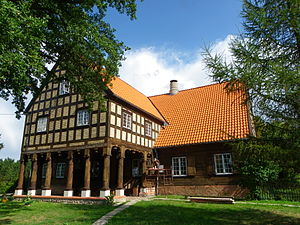Marienau (Pomeranian Voivodeship, Poland)

Source: Catalogue of Monuments of Dutch Colonization in Poland website

Source: Vorlaubenhäuser im Weichselwerder, Das Land Des Deutschen Orden: Ostpreussen-Westpreussen-Memelland.

Photo by Pomuchelskopp.
Source: Wikimedia Commons.
Marienau (also known as Margenau, Marjenau, and Marynowy; now known as Marynowy; coordinates: 54.163333, 19.092222 [54° 9′ 48″ N, 19° 5′ 32″ E]; population in 1905, 727; in 2012, 570) is located approximately 7 kilometres (4 miles) south of Nowy Dwór Gdański (Tiegenhof), 15 km. (9 mi.) north of Malbork (Marienburg), 19 km. (12 mi.) west of Elbląg (Elbing), and 38 km. (24 mi.) south-east of the regional capital Gdańsk (Danzig).
Marienau was founded by Werner von Orseln, Grand Master of the Teutonic Order, in 1321 under the Chełmno charter (Kulm Law, a legal constitution for a municipal form of government) in place of an earlier settlement, Mergenow. At the time, the village had 70 włókas (1,257 hectares) and a Roman Catholic parish. Until 1772 Marienau was part of the Kingdom of Poland. The First Partition of Poland in 1772 resulted in the creation of a new province in 1773, called West Prussia, in which Marienau was located. Marienau was situated in the district (Kreis) of Marienburg until the establishment of the Free City of Danzig in 1920. The village came under the control of Nazi Germany during World War II until February 1945, when it was occupied by Soviet forces and returned to Poland. In 2012 Marienau (now Marynowy) was a village in the administrative district of Gmina Nowy Dwór Gdański, within Nowy Dwór Gdański County, Pomeranian Voivodeship.
The 1776 Prussian census lists 23 Mennonite families with the following surnames: Allert, Barckmann, Bargen, Claassen, Dick, Epp, Frese, Hein, Pauls, Penner, Regehr, Warkentin, Wiebe, and Wieler. In 1820, the village had 724 residents, including 93 Mennonites. In the 2nd half of the 19th century, Marynowy had 137 włókas (2,459 hectares) of land, 79 houses, 864 Catholics and Lutherans, and 106 Mennonites.
The Flemish Mennonites of Marienau were members of the Rosenort Mennonite Church while the Frisian Mennonites were members of the Orlofferfelde Mennonite Church.
Bibliography
Stowarzyszenie Konserwatorów Zabytków. "Marynowy." Catalogue of Monuments of Dutch Colonization in Poland. 2005. Web. 13 November 2012. http://holland.org.pl/art.php?kat=obiekt&id=382&lang=en.
Wikipedia. "Marynowy." Web. 13 November 2012. http://en.wikipedia.org/wiki/Marynowy.
Wolf, Hans-Jürgen. "Familienforschung in Westpreußen." Web. 13 November 2012. http://www.westpreussen.de/pages/forschungshilfen/ortsverzeichnis/details.php?ID=4154.
Maps
Map:Marynowy, Pomeranian Voivodeship, Poland
| Author(s) | Richard D Thiessen |
|---|---|
| Date Published | November 2012 |
Cite This Article
MLA style
Thiessen, Richard D. "Marienau (Pomeranian Voivodeship, Poland)." Global Anabaptist Mennonite Encyclopedia Online. November 2012. Web. 12 Feb 2026. https://gameo.org/index.php?title=Marienau_(Pomeranian_Voivodeship,_Poland)&oldid=168619.
APA style
Thiessen, Richard D. (November 2012). Marienau (Pomeranian Voivodeship, Poland). Global Anabaptist Mennonite Encyclopedia Online. Retrieved 12 February 2026, from https://gameo.org/index.php?title=Marienau_(Pomeranian_Voivodeship,_Poland)&oldid=168619.
©1996-2026 by the Global Anabaptist Mennonite Encyclopedia Online. All rights reserved.
